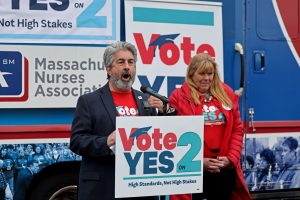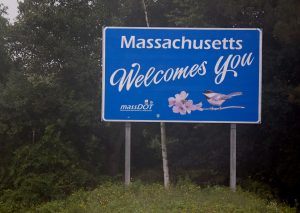
Bruins struggling because of Massachusetts state taxes, business coalition argues
A trend is forming in the Boston sports scene: if a team struggles, state taxes are blamed for the poor performance.
The Massachusetts Opportunity Alliance, a business coalition focused on improving economic competitiveness, has released an analysis pinpointing how the Bruins are losing out on top talent to teams in states without income taxes.
A month into the NHL season, Boston sits at the bottom of the Atlantic Division, recording just nine points, as of Friday. The Florida Panthers, the 2024 Stanley Cup winners, lead the division, playing in a state without income taxes.
“The Boston Bruins are off to a rough start this season, thanks to a weak offense, the loss of Jake DeBrusk, or a struggling middle six, depending on who you ask,” Massachusetts Opportunity Alliance said in a statement Friday. “Bruins fans can also blame an unexpected culprit: State taxes.”
The Bruins’ top players — superstar right-winger David Pastrnak, left-winger Brad Marchand, defenseman Charlie McAvoy and goalie Jeremy Swayman — all could have made hundreds of thousands if not nearly $1 million more in a no-income-tax state under the same contract terms, the analysis found.
For instance, Marchand, who has been in Boston since 2009-10, is in the final season of an eight-year, $49 million contract. The deal inked before the 2017-18 campaign carried an annual average salary cap hit of $6.13 million.
Last season, Marchand is estimated to have received $5 million in compensation — $2 million in signing bonuses and $3 million in base salary, according to reports.
Of the total compensation, the left-winger took home roughly $2.9 million after regular income taxes, at a rate of 5%, and the state’s new surtax of 4% on incomes over $1 million kicked in, Massachusetts Opportunity Alliance found.
Marchand could have made roughly $3.3 million in total pay — a $365,700 difference — if he played for a team in a state without an income tax (i.e., Tampa Bay Lightning, Nashville Predators, Vegas Golden Knights, Dallas Stars, Seattle Kraken), the analysis states.
Four of the past five Stanley Cup championship teams have come from states that don’t collect income taxes — Panthers, Knights, Lightning and Stars.
“With the Boston Bruins’ last Stanley Cup win in 2011 being over a decade ago now, fans are itching for another championship,” Massachusetts Opportunity Alliance said in its statement. “It looks like we might have to wait if Massachusetts income taxes remain at their high rate.”
The alliance also highlighted how the Fair Share Amendment, or the so-called “millionaire’s tax,” is causing Bruins players to lose out on making as much if they played in a state that did have an income tax but not a surtax.
Bill Belichick set a fire when the legendary former Patriots coach slammed the millionaire’s tax in August for making it hard to recruit top NFL free agents to play in what he called “Taxachusetts.”
Current defensive linemen Keion White and Davon Godchaux echoed their former coach’s statements, with Godchaux saying, “If you can sign with a team with no state tax, then go ahead and sign with them because that’s more money you keep in your pocket.”
In response, State Rep. Michael Connolly, D-Cambridge, told the players, via social media, to “stop complaining” and focus more on “winning ballgames.”
“If Massachusetts wants to remain a Commonwealth of Champions, we need to incentivize the best talent — in sports and beyond — to grow their careers here,” the Massachusetts Opportunity Alliance said.
The millionaire’s tax hasn’t impacted the Celtics and their spending ways.
The 2025-26 Celtics are on track to be the most expensive roster in NBA history, with $225 million in payroll plus upward of $210 million in luxury tax charges.


